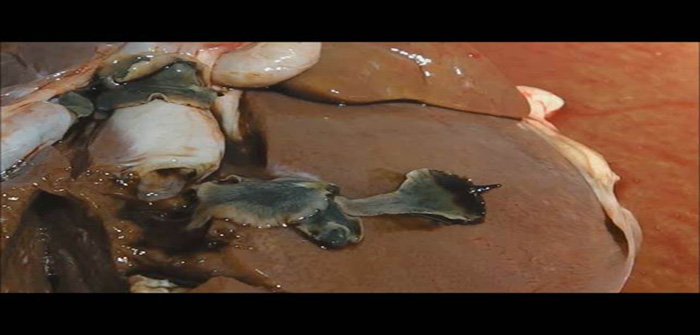The Sustainable Control of Parasites in Sheep (SCOPS) and Control of Cattle Parasites Sustainably (COWS) groups have issued a warning to cattle and sheep farmers to not let liver fluke catch them out.
There was a relatively low and later than normal challenge in many parts of the UK throughout 2020, largely due to the legacy of the dry summer in 2018 and successive dry springs in 2019 and 2020 – but more recent weather patterns mean we are now starting to see evidence of fluke infection in some parts of the country.
Sub-acute cases in sheep, caused by migrating immature fluke, have been reported in North West England, and APHA has identified cases in the Midlands and Cumbria too. Positive fluke egg counts are also starting to be seen in the West of Scotland, indicative of the presence of adult fluke.
The need to stay vigilant and keep using the tests available to monitor the situation on farms has never been greater, says experts from the two groups.
As an example, the University of Liverpool has tested first season grazing lambs and calves from across the country and seen significant regional variation. Even within a county there are differences between individual farms.
While farms from Wiltshire, North Yorkshire and Northampton have tested negative, farms from East Sussex and Exeter were positive. This highlights how important it is to test stock before treatment. There are also reports of coproantigen positives from Cheshire, the North of England and Scottish Borders.
Different results can be seen in different groups of animals grazed on different parts of the farm, again highlighting the need to test before you treat.
Forecast
The NADIS liver fluke forecast said the dry September followed by a pretty rainy October meant liver fluke risk was predicted to be ‘high’ in West Scotland and Northern Ireland.
North West England and North Wales were classed as ‘medium’ risk. However, like last year, it’s worth noting that November was actually very mild (albeit still relatively dry in most places) so development of fluke stages could have continued later into the year again, particularly further south.
Temperatures in December were more typical and the current cold spell, with average temperatures well below 10oC, is expected to have more or less stopped any further development.
Having said that, some parts of the country only had a brief cold spell then a lot more rain, with evidence of snail activity even in January.
How to test/options available
In the autumn fluke update, SCOPS and COWS advocated the use of serological i.e. blood testing to monitor infection in lambs and calves, because they were in their first grazing season and, therefore, good sentinels for infection.
At this time of the year, most of the fluke are adults so the preferred option is testing of faeces using either the fluke egg count or the coproantigen test. These tests can be applied to any age or management group of sheep and cattle and are relatively straightforward samples to collect.
Faecal testing from late autumn through to spring will tell farmers whether or not treatment is needed, and help guide the timing of treatment and product choice. It also provides an opportunity to see how well any treatment has worked with follow-up testing. For animals kept outdoors, regular testing would be best – it helps monitor the reinfection rate and can be a good indicator if retreatment is necessary.
For housed animals a single test before turnout lets you know if there are any ‘leftovers’ from housing treatment.
Treatment
If results come back positive, discuss with your veterinarian or SQP which product to choose for treatment. The SCOPS/COWS treatment table can help to select the right treatment and optimise timing.
- For sheep: If animals still grazing outside, most fluke will be late immature and/or adults, so a product targeting these stages (closantel or nitroxinil) would be advised. Later in the spring, products targeting adult fluke could be used (albendazole or oxyclozanide). Avoid turning sheep out onto ‘fluky’ pasture once treated, to prevent re-infection
- For cattle: Assuming cattle were housed in October, most fluke will now be adults. A faecal egg count or the coproantigen test could be used. A product targeting adult fluke such as clorsulon or oxyclozanide can be prescribed. Treatments given early after housing are likely to miss some immature fluke. By spring and turn-out, these will now be adults and producing eggs. Test in the spring using either the faecal egg count or coproantigen test to show if stock are still infected. Following a positive test, a pre-turnout treatment with a product targeting adult fluke (clorsulon, oxyclozanide or albendazole) will reduce pasture contamination with fluke eggs in the spring, just as the mud snails are becoming active again.


